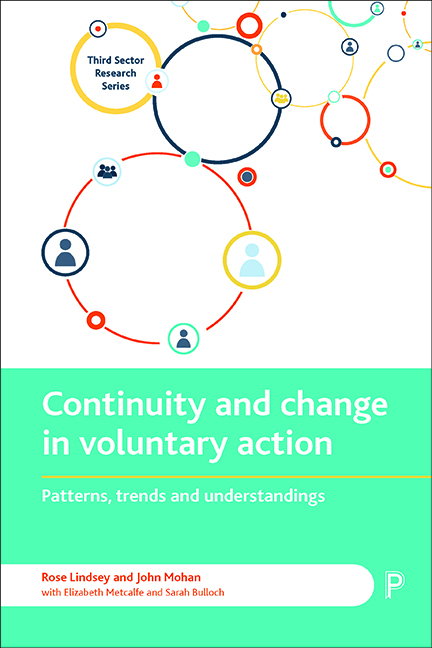Book contents
- Frontmatter
- Contents
- List of figures and tables
- Foreword
- Acknowledgements
- Notes on authors
- Acronyms
- one Introduction
- two The changing policy environment for voluntary action from 1979
- three Data: sources and definitions
- four Trends in volunteering and trends in the voluntary sector
- five Content and context of volunteering
- six Why people volunteer: contextualising motivation
- seven Volunteering trajectories: individual patterns of volunteering over the lifecourse
- eight Attitudes to voluntary action
- nine Conclusions
- Appendix: Anonymised details of writers
- References
- Index
eight - Attitudes to voluntary action
Published online by Cambridge University Press: 13 April 2022
- Frontmatter
- Contents
- List of figures and tables
- Foreword
- Acknowledgements
- Notes on authors
- Acronyms
- one Introduction
- two The changing policy environment for voluntary action from 1979
- three Data: sources and definitions
- four Trends in volunteering and trends in the voluntary sector
- five Content and context of volunteering
- six Why people volunteer: contextualising motivation
- seven Volunteering trajectories: individual patterns of volunteering over the lifecourse
- eight Attitudes to voluntary action
- nine Conclusions
- Appendix: Anonymised details of writers
- References
- Index
Summary
Introduction
We have previously shown that rates of engagement in volunteering have been stable over the time period covered by this book. However, knowing that members of the public engage in voluntary action at a relatively high and stable level does not tell us about their attitudes to voluntary action. Do they regard volunteering as a duty? What is their view of the position of volunteering in British society? What do they think about the importance of volunteering and of the balance between statutory and voluntary provision of public services?
An inquiry into attitudes to voluntary action could encompass consideration of the public's understanding of the social and individual benefits of volunteering, their perception of the roles and efficiency of voluntary organisations, and the contribution of voluntary organisations to the delivery of public services. It might also investigate public attitudes to specific issues, such as the recently topical issue of fundraising tactics by UK charities. Few of these topics have been the subject of robust national surveys. The major surveys of volunteering in 1981 and 1991 incorporated various questions on individuals’ understanding of volunteering and attitudes regarding its wider social benefits. The long-running British Social Attitudes Survey (BSAS) has intermittently included some relevant questions, such as: whether individuals were ‘currently a member of voluntary groups to help the sick/elderly/children/other vulnerable group’ (1997, 1998, 2000, 2012); whether people had done ‘volunteer work’ (note, not ‘unpaid help’) in any of the following areas – charitable, political, religious and church-related; whether they had undertaken any other kind of voluntary activities (asked in two waves, in 1998 and 2000); and whether they were members of a broader range of local community or voluntary groups (1994, 1997, 1998, 2000, 2012). Frustratingly, these hardly ever coincided with other BSAS questions on whether society relied too much on volunteers (1993, 1996); on whether ‘everyone has a duty to do voluntary work at some time in our lives’ (1993, 1996); and on whether doing voluntary work was a good thing for volunteers because it makes them feel that they are contributing to society (1994, 1996).
- Type
- Chapter
- Information
- Continuity and Change in Voluntary ActionPatterns, Trends and Understandings, pp. 183 - 216Publisher: Bristol University PressPrint publication year: 2018



